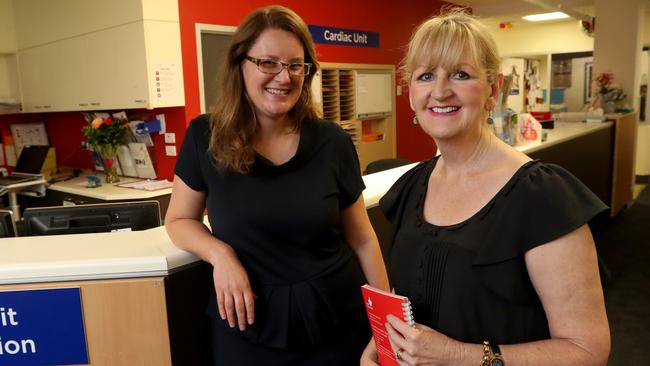Uni of South Australia, Calvary Health to work on clinical training
A new partnership will allow undergraduate nursing and allied health students to access a unique training model.

A new partnership thought to be the first of its kind between a private hospital and public university will allow undergraduate nursing and allied health students to access a unique education and training model in South Australia.
University of South Australia School of Nursing and Midwifery head Professor Carol Grech is deep in the planning stage for the creation of a clinical training school at the Calvary Health Group’s new private city hospital, to be opened late in 2018.
The new hospital and healthcare provider will more than double its capacity from 180 beds at its Wakefield site and 65 at its College Grove rehabilitation facility to 340 beds. Its 24-hour emergency service will more than double in capacity as well, easing the load for private patients who may have been taken to the new Royal Adelaide Hospital once it opens.
The school will provide extra training opportunities for the state’s undergraduate and graduate nurses and allied health students, given there are more than 1000 annual nursing graduates from UniSA, Flinders and Adelaide universities and several hundred can’t get training places.
“One of the things Calvary will do is a lot of the cardiac services and surgery where you’ve got opportunities for these centres of excellence to evolve,” Grech says.
“They’ll provide training opportunities for students to specialise in these areas, which doesn’t happen at the moment at an undergraduate level.”
According to the latest Health Workforce Australia report there will be a shortage of 85,000 nurses by 2025, and Grech says the partnership will help increase training places.
“It’s not about increasing our intake of students but the key for me is the quality of the placements we can provide and therefore the quality of the graduate and the quality of the care that can be delivered,” she says.
Grech says the partnership came about after vice chancellor David Lloyd looked at the school and considered how to improve its offerings and whether a new way of education could be delivered.
While there are partnerships and agreements between public hospitals and universities across the nation, including remote area nursing training in Tasmania and several country areas, there are very few between private providers and universities, and very few with purpose-built and integrated clinics for undergraduates.
In Queensland, Greenslopes Private Hospital and the Gold Coast Institute of TAFE developed a partnership to deliver a diploma in nursing, but it does not involve a university.
There are also graduate programs available at other private hospitals, including St Vincent’s Private Hospital in Melbourne.
Grech says the UniSA and Calvary partnership will also provide multidisciplinary specialist training, allowing undergraduates to specialise early in their careers.
“It needs to be based on a model that the medical schools use, with nursing, physiotherapy, occupational therapy, sports science and exercise scientists working around rehab,” she says.
With demand for health professionals likely to increase drastically over the next 20 years because of an ageing population and the rollout of the National Disability Insurance Scheme, Grech says the training centre is likely to offer a new standard of education and training. The model will allow students on clinical placements to learn from university staff who may be on secondment, or experienced nursing and allied health professionals working within the Calvary system. Grech says it will also include research, clinicians and evidence-based practice.
“Adelaide is a bit unique, it’s small enough to be able to do this,” she says.
“There’s a really good feel and fit between UniSA and the Calvary group and hopefully it will be a really successful partnership. The fact that we’re right at the front of the development of this allows us to have more opportunities with Calvary about the education framework, about what they want to do and their strategic plans.”
Calvary chief executive Juanita Ielasi says the partnership will put clinicians — particularly those in allied health such as physiotherapists, social workers, dietitians and occupational therapists who have not had as much experience with teaching — at the forefront of learning themselves.
“For us as an organisation the more we expose our existing clinicians to evidence-based practice it helps their practice, it keeps their knowledge current, it opens the way to research partnerships,” Ielasi says. “They feel they can make better decisions and be at the forefront.”
Ielasi says that while the healthcare provider has taken nursing students for years, it has not always taken many allied health students. The partnership will create greater opportunities for those allied health students who have generally gone into the public hospital system for placements, and puts Calvary forward as a future employer of choice.
“The public sector is under increasing pressure and it’s always taken the majority of students and it becomes a case of how we can help,” she says.
Ielasi praises what she says is taking nursing and allied health training to a new level. For more than 20 years it has been based on university training and clinical placements, but under the collaborative partnership it will be based on information sharing.
In the past placements have also been compartmentalised, where medical schools organised training separately from nursing and allied health. The Calvary and UniSA partnership is being co-ordinated across the three disciplines.
“There’s been a traditional approach, particularly when you look at nursing when it went into universities, and there’s always been placements,” she says.
“Hospitals would negotiate those placements and how they would work. We’re doing it from a medical perspective with clinicians and how they think it would work based on their practice, the university’s teaching and patient needs.”
The partnership will take in community care and home-based services under the supervision of Calvary’s clinicians, which has also been underused for private sector placements.


